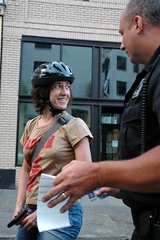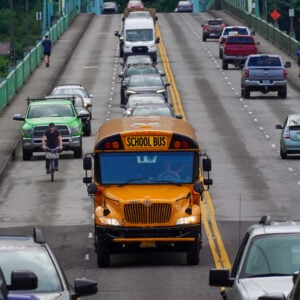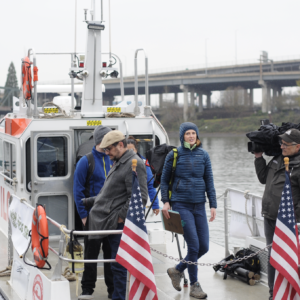Last week we reported on State Representative Jules Bailey‘s proposed bill to create a new vehicle weight class that would include bicycles and to base traffic fine amounts on the weight class of offenders’ vehicles.
If passed, the law would have meant a dramatic decrease in the amount of fines for most traffic violations by people on bicycles. However, it now looks like that bill is going to have to wait until another legislative session.
In an email to me earlier this week, Bailey wrote that the draft of the bill that came out of the Legislative Counsel (LC, where all bill proposal are written up and become real bills), “simply allowed juries to make judgments about lowering fines for bicycles. This is not at all what I intended. It [the bill he got back from LC] has nothing about vehicle weight.”
Bailey’s office received the bill draft on Saturday. The final deadline for submitting bill ideas for drafting was this week, so there was no time to resubmit it.
The option of amending the bill is also off the table. Here why, according to Bailey (emphasis mine):
“Normally if a bill is bad, you can amend it in committee process, but only along the lines of the relating clause. However, the relating clause is “relating to bicycles” which prevents any amendments that deal with vehicle weight in general, which was the intent of the bill. So basically there are few options left to get a comprehensive bill relating to vehicle weight. I think it makes more sense to get something prepared, with stakeholders, for the next session.
It will be interesting to see how and if the idea of weight-based traffic fines picks up steam, and who will end up going to bat for it the next time it comes around.








Thanks for reading.
BikePortland has served this community with independent community journalism since 2005. We rely on subscriptions from readers like you to survive. Your financial support is vital in keeping this valuable resource alive and well.
Please subscribe today to strengthen and expand our work.
Legislative Counsel can be a huge pain. They try, but are far from perfect at producing the right content.
Jules, thank you for taking this on and showing a willingness to lead for bikes as a 1st term legislator. Lets bring this idea back next round and make it happen! Having the change to work with stakeholders and build a coalition should make help to make it into law.
Good effort. My dreams still lie with passing the Idaho stop law.
I find that incredibly curious – LC can indeed be a pain but they tend to do their best to provide the members the service they want…they’re very clear, “You make the laws, we just write them.” I kind of wonder what was submitted to them.
How is this supposed to “help bikes.” Does nearly everyone on a bicycle blowing a stop sign hurt or help car/bike issues in Portland?
I’m going to guess they help motorists see bicycles as a more legitimate road users…..oh wait….maybe I have that backwards.
Idaho stop law is a good idea. “Running” a red on a bike should be comparable to jay walking, an unenforced nuisance. Ability to see and hear clearly, manuverability, and low potential to cause damage align bikes more with pedestrians. Bikes should get the better of both car and pedestrian laws, since they are the ultimate form of transportation.
Post #4:
The Idaho Stop would effectively make stop signs yield signs for cyclists, which is a practical, safe way to control intersections.
Just to be clear, if a bicycle sees a stop sign they must yield to cross traffic. Adopting a law like Idaho’s would not give cyclists license to “blow” stop signs.
while im grateful that jules has shown this willingness to go out there for bikes in this department, i still think weight-based legislation is flawed, and theres got to be a better way to do this, and as such, im glad to see it nipped in the bud.
i just gotta say, in that photo it very much *looks* like she’s holding a small-caliber handgun, & is having an amusingly evil thought about poppin’ the cop…what the h*ll is she holding?
Is that a taser in your pocket or are you just happy to see me?
Joel,
I’m curious why you view weight-based legislation as flawed. Is it flawed in the sense as it relates specifically to bicycles or because it increases fines in other areas?
A GVW-specific fee structure is heavily flawed. It undermines right of way laws. If low-weight vehicles are worth less in traffic violations, it follows that larger weight vehicles should be given other priorities– like, for example, road use. Scaling of this kind should be avoided– instead, vehicles of all speeds and weights should be given equal treatment under the law. In fact, they ARE given equal treatment as it stands now, which is why this kind of proposal is so mystifying to me. Is it really that hard to follow traffic laws?
Where this kind of thinking really wears thin is in its assumption that the laws exist in order to keep large/fast vehicles from crushing smaller/slower vehicles. This assumption is incorrect. The laws exist to keep order on the roadways.
There’s also an incorrect notion, popular among cyclists, that cyclists are harmless to other road users, and it’s just bullshit (holier-than-thou bullshit, though, that’s embedded in the similarly bogus cyclist-as-martyr mentality).
There are plenty of potential accident scenarios that have nothing to do with a vehicle running a stop sign and crashing into another vehicle/road user. For example, a cyclist runs a stop sign. In order to avoid hitting the cyclist, a motorist swerves onto the curb and hits a pedestrian. Or swerves into another vehicle and causes some kind of damage/injury. Etc. Let’s not even get into how stupid/childish/selfish the notion is that as a cyclist, your life is worthless and thus you should be able to do whatever you want at intersections. Tell that to your mom. Or your friends. Or anyone else who cares about you.
patrick…..don’t be writin on this blog and makin so much sense, it won’t be taken or digested well with most folks on this forum….
He should file it anyway. The relating clause could make it a candidate for a nice gut-n-stuff.
The laws exist to keep order on the roadways.
Well, yes and no. The laws exist because somebody passed them. There are certainly very many people who value order over safety, but I’ve never understood that tradeoff.
I live in Massachusetts, not Oregon, and we did recently pass some bicycle-related legislation, and the reasons used to justify the legislation were a combination of both order and safety. “Order”, in the sense that it makes sense to align local laws with the UVC, and “safety”, in the sense that in order to convince legislators that it was ok to allow bicycles to ride two abreast, we pointed to (among other things) a crash study from Orlando, detailing all the crash causes over a period of time, and (lucky for us) bikes ride two or more abreast was never a factor.
In some other countries, the default fault for a crash of a bicycle and a car is assigned to a car.
Patrick, I don’t see your logic. Why should it follow that heavier weight vehicles would get more rights? The level of fine is not to signify a vehicle’s importance, it’s to signify the potential damage it might cause. Insurance companies already do this. IF your vehicle will be more expensive to repair or might cause more damage, your insurance rate will be much higher. Does this mean that people with cheaper to insure cars get sub-par service from the insurance companies?
When can we start giving people who ride bikes a bit of a break?
dr2rchase,
I used to think that too until talking to a Dutch resident. He told me that the motorist has to prove, and can prove, that it was the bicyclists fault.
For years I have been going around saying, “in the Netherlands if a bicyclists is hit by a car it is case closed”
Turns out I was wrong and unintentionally lying for years now.